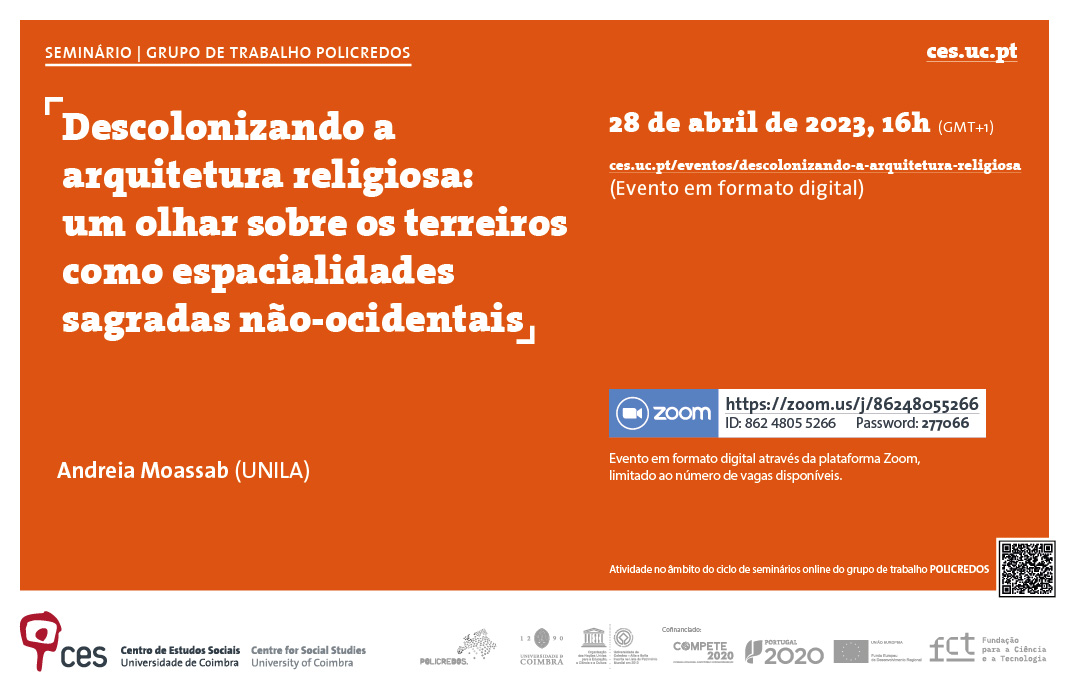POLICREDOS - Religions and Society
Webinar | POLICREDOS WORKING GROUP
Decolonising religious architecture: a look at terreiros as non-Western sacred spatialities
Andreia Moassab (UNILA)
April 28, 2023, 16h00 (GMT+1)
Online event
About
Literature on religious architecture has, over time, favoured the analysis of monuments and buildings related to a Judeo-Christian matrix. In this context, other religious architectures have been under-represented, namely those associated with racialised people and/or perceived as members of minority groups. Consequently, a reflection on the materiality of the sacred through non-Western epistemological lenses has been invisibilised and considered of lesser importance in religion studies. Likewise, its projective forms, modes of representation and aesthetics pass into history as residual and particular. Against this erasure, this seminar seeks to reflect on this under-representation of terreiros in academic literature, whether on architecture or religion. The critique of this under-representation is made from two theoretical lenses: decolonial thought and critical race theory. By observing the ways of organising spaces and building the relationship with the sacred, this seminar interweaves the following issues: (1) the different grammars of construction and occupation of space in terreiros, (2) the structural racism that under-values Candomblé and Umbanda as legitimate religious practices in Latin America, and (3) the urgency of decolonising the studies of religion and architecture so that other epistemologies of the sacred emerge.
Bio note
Andreia Moassab is an architect and urban planner, with a master's and doctorate from the Postgraduate Studies Programme in Communication and Semiotics at PUCSP. In 2007/08 she completed her doctoral internship at the Centre for Social Studies of the University of Coimbra (Portugal), under supervision of Boaventura de Sousa Santos. Her scientific articles have addressed the right to housing, the right to territory, feminism, racism, the social insertion of technology and historical heritage. Since 1992 she has been working with urban planning and regional development, having coordinated projects in several parts and biomes of Brazil. She worked with land regularisation at CDHU-Companhia de Desenvolvimento Habitacional e Urbano do Estado de São Paulo (1996-2001). In Cape Verde (Africa) she was a consultant for MDHOT - Ministry of Development, Housing and Spatial Planning – and the United Nations. She was research coordinator of the Research Centre for Local Development and Spatial Planning at the University of Cape Verde (2009-2012) and lecturer in the Science and Technology department. Moassab is currently a lecturer in the architecture and urbanism course and in the postgraduate programmes in public policies and development and in contemporary integration of Latin America at the Federal University of Latin American Integration (UNILA/Brazil). She was also coordinator of the architecture and urbanism programme at UNILA [2013-15], responsible for the elaboration of its first pedagogical project. She is the leader of MALOCA - Group of Multidisciplinary Studies in Architecture and Urbanism of the South. She is the author of the book “Brasil Periferia(s): a Comunicação Insurgente do Hip-Hop” (Educ/Fapesp, 2011), finalist of the Jabuti 2013 award, in the human sciences category. She is the author, with Egon Vetorazzi, of the book “Morar na Barranca” (Edunila, 2019) and edited, with Leo Name, the book “Por um Ensino Insurgente em Arquitetura e Urbanismo” (Edunila, 2020), considered the second best book of 2021 in applied social sciences, by ABEU - Brazilian Association of University Publishers.
Seminar within the Policredos Working Group
______________________
This activity will be provided through Zoom platform and does not require registration. Participation is limited to the number of places available >> https://zoom.us/j/86248055266 | ID: 862 4805 5266 | Password: 277066
Please keep the microphone on mute until the discussion is open. The host may remove disruptive participants.
Open activities in digital format, such as this one, do not grant a declaration of participation. Such document will only be guaranteed in events with prior registration and regulated access.


